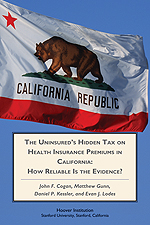 STANFORD—A new report from the Hoover Institution disputes findings in a key study that has been used by advocates of health care reform to shape California’s proposed health-care reforms.
STANFORD—A new report from the Hoover Institution disputes findings in a key study that has been used by advocates of health care reform to shape California’s proposed health-care reforms.
In The Uninsured’s Hidden Tax on Health Insurance Premiums in California: How Reliable Is the Evidence? the authors, John Cogan, Matthew Gunn, Daniel Kessler, and Evan Lodes, demonstrate that the New America Foundation (NAF) study contains several errors that inflate the so-called hidden tax, seen as a boon by reformers.
“The NAF study overstates the amount of care received by uninsured persons,” said Kessler, Hoover senior fellow and associate professor at the Graduate School of Business at StanfordUniversity, “and it understates the revenues currently available to fund that care.”
The authors note that the foundation implausibly assumes that privately insured persons bear all the costs of the uninsured. “Even if the insured did bear all the costs, it would only be 2.8 percent of the insurance premium, not the 10 percent the foundation study estimates,” Kessler added.
The basic premise behind many recent California health-care reform plans is that Californians who have health insurance bear a large part of the financial burden of the health-care services provided to the uninsured. Many reform advocates believe that the amount of money involved in the practice of shifting costs from the uninsured to the insured (the hidden tax) is large enough that the proposed reforms, which include mandates and new taxes, will actually reduce those premiums. Not so, say the Hoover authors.
Cogan and Kessler are also coauthors, with Glenn Hubbard, of Healthy, Wealthy, and Wise: Five Steps to a Better Health Care System, which recommends federal policy changes to improve U.S. health-care markets.













